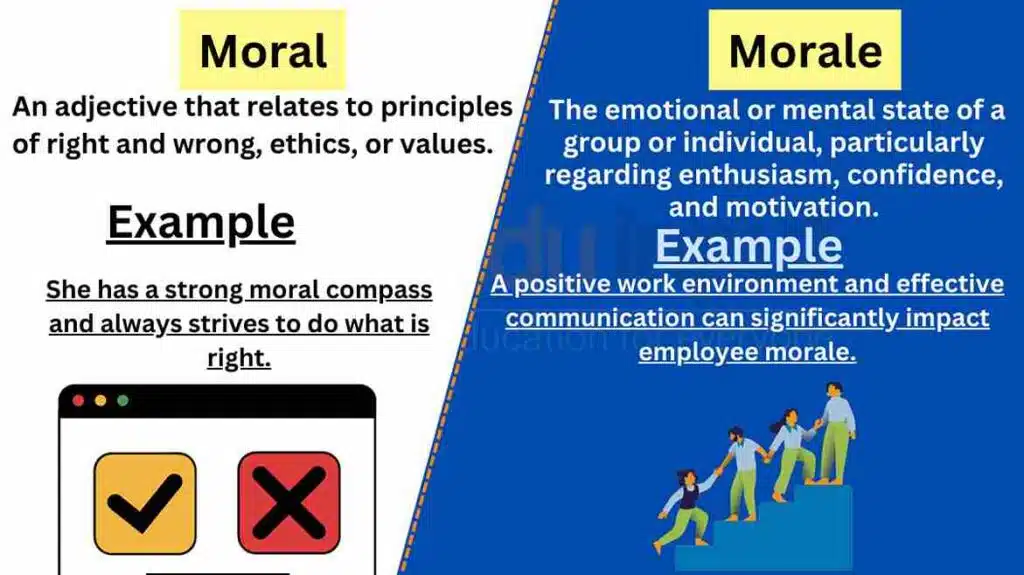Moral vs Morale-Difference Between And Examples
The English language often presents us with words that may sound similar but have distinct meanings and contexts. Two such words that can cause confusion are “moral” and “morale.” Despite their similar spellings, these terms have different definitions and implications.
This article aims to clarify the differences between “moral” and “morale,” exploring their individual meanings and usage. By understanding their unique connotations, we can effectively communicate and avoid misunderstandings. Join us as we delve into the realms of ethics and group dynamics.

Meanings and Examples
Moral Meaning
“Moral” is an adjective that relates to principles of right and wrong, ethics, or values.
Moral Examples
- “She has a strong moral compass and always strives to do what is right.”
- “The moral dilemma in the story challenges the characters’ ethical beliefs.”
- “Honesty, integrity, and compassion are considered important moral values.”
Morale Meaning
The meaning of “Morale” refers to the emotional or mental state of a group or individual, particularly regarding enthusiasm, confidence, and motivation.
Morale Examples
- “The team’s morale was high after their victory in the championship.”
- “The company introduced employee recognition programs to boost morale in the workplace.”
- “A positive work environment and effective communication can significantly impact employee morale.”
Difference Between Moral and Morale
| Moral | Morale | |
| Meaning | Relating to principles of right and wrong, ethics, or values | Emotional or mental state of a group or individual, particularly enthusiasm |
| Example | “She has a strong moral compass and always strives to do what is right.” | “The team’s morale was high after their victory in the championship.” |
| Usage | Ethics, values, principles | Group dynamics, motivation, enthusiasm |
| Context | Personal conduct, decision-making, ethical considerations | Team spirit, workplace environment, motivation |
Usage in a Paragraph
The term “moral” is commonly used to describe matters related to ethics, values, and principles of right and wrong. It pertains to personal conduct and decision-making, encompassing a range of ethical considerations. When we discuss moral issues, we delve into questions of what is considered morally right or wrong, just or unjust. Moral values play a significant role in guiding our behavior and shaping our character, and they vary across cultures and individuals. Understanding and adhering to moral principles is essential for maintaining a just and harmonious society.
On the other hand, “morale” refers to the emotional or mental state of a group or individual, particularly regarding enthusiasm, confidence, and motivation. It pertains to the overall spirit, attitude, and well-being of a team, organization, or community. High morale is often associated with a positive work environment, effective leadership, and a sense of shared purpose. It boosts motivation, productivity, and collaboration. Conversely, low morale can result from factors such as conflict, lack of recognition, or a challenging work environment. Recognizing and addressing morale issues is crucial for fostering a supportive and thriving atmosphere.
While “moral” and “morale” may appear similar, they have distinct meanings and applications. “Moral” pertains to principles of right and wrong, ethics, and personal conduct, guiding our decision-making processes and shaping our values. On the other hand, “morale” refers to the emotional or mental state of a group or individual, encompassing enthusiasm, motivation, and confidence. Understanding the nuances between these terms allows for effective communication regarding ethical matters and group dynamics. By acknowledging the significance of both moral values and team morale, we can contribute to a more just and cohesive society.







Leave a Reply